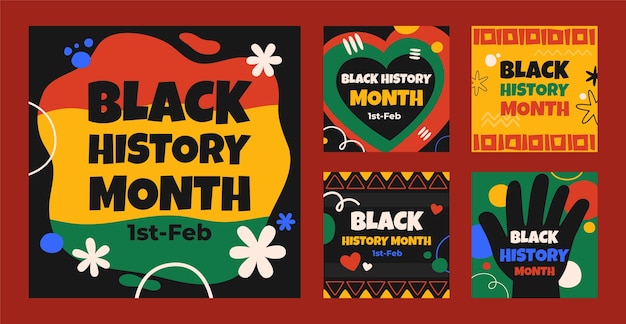Discovering Fascinating Trivia about Black History Month

Black History Month celebrates the achievements and contributions of black individuals throughout history.
Did you know that Black History Month originated in the United States but is now celebrated in many countries around the world?
The idea for Black History Month was first proposed by historian Carter G. Woodson in 19
4. Black History Month showcases the extraordinary resilience and perseverance of the black community.
Activist Rosa Parks, known as the Mother of the Civil Rights Movement, refused to give up her bus seat in Montgomery, Alabama, sparking a major protest.
The Underground Railroad was a network of secret routes and safe houses used to help enslaved African Americans escape to freedom.
African Americans have made significant contributions to science, including the development of the blood bank by Dr. Charles Drew.
African American poet Langston Hughes played a major role in the Harlem Renaissance, a cultural movement that celebrated black art and literature.
Jazz music, often referred to as America’s classical music, was largely developed by African American musicians in the early 20th century.
The African American civil rights activist Martin Luther King Jr. delivered his iconic I Have a Dream speech during the March on Washington in 1963.
Black History Month is an opportunity to celebrate the rich cultural heritage of African Americans.
The first black-owned and operated television station in the United States was founded by African American entrepreneur Robert L. Johnson.
Discovering Fascinating Trivia about Black History Month part 2
Madam C.J. Walker, born Sarah Breedlove, became the first self-made female millionaire in America by creating hair care products for black women.
Notable black inventors include Garrett Morgan (traffic signal), Sarah Goode (folding cabinet bed), and Lewis Latimer (carbon filament for light bulbs).
Black History Month educates people about lesser-known figures who have made significant contributions to society.
The movie Hidden Figures shed light on the important role black women played in NASA’s space program during the 1960s.
In 2008, Barack Obama became the first African American to be elected as President of the United States.
The Black Lives Matter movement, which gained prominence in 2013, raises awareness about police brutality and racial injustice.
Black History Month encourages open dialogue about racial issues and promotes equality.
African American athletes, such as Jesse Owens and Wilma Rudolph, have broken numerous records and overcome discrimination in the world of sports.
The term Black History Month was officially recognized by the US government in 1976.
The civil rights activist Malcolm X advocated for black empowerment and self-defense.
The Apollo Theater in Harlem, New York, has been a major venue for black performers since the early 20th century.
The iconic singer and activist Nina Simone used her platform to shed light on racial inequality and promote social justice.
The 369th Infantry Regiment, known as the Harlem Hellfighters, was an African American unit that fought heroically in World War I.
Black History Month emphasizes the importance of diversity and inclusion in all aspects of society.
African American author Toni Morrison won the Nobel Prize in Literature in 1993, becoming the first black woman to receive the honor.
The Tuskegee Airmen were the first African American military aviators in the United States Armed Forces.
The Montgomery bus boycott, led by Martin Luther King Jr., lasted for 381 days and eventually led to the desegregation of buses in Montgomery.
The term Black History Month is sometimes abbreviated as BHM.
African American baseball player Jackie Robinson broke the color barrier in professional sports when he joined the Brooklyn Dodgers in 1947.
The Civil Rights Act of 1964 outlawed discrimination based on race, color, religion, sex, or national origin.
Black History Month encourages individuals to learn from the mistakes of the past and work towards a more inclusive future.
African American abolitionist Harriet Tubman helped hundreds of enslaved people escape to freedom through the Underground Railroad.
The Black Panther Party, founded in 1966, advocated for the rights of African Americans and challenged police brutality.
Black History Month celebrates the cultural contributions of African Americans in various art forms, including dance, theater, and literature.
African American mathematician Katherine Johnson played a crucial role in NASA’s calculations for space missions, including the Apollo 11 moon landing.
During the Harlem Renaissance, African American artists like Jacob Lawrence and Aaron Douglas depicted the black experience through visual arts.
The Green Book was a guidebook used by African American travelers to find safe accommodations during the era of racial segregation.
Black History Month reminds us of the ongoing struggles for racial equality and the importance of continued activism.
African American filmmaker Spike Lee has made significant contributions to the film industry, addressing social issues in his movies.
The Negro National League, founded in 1920, provided opportunities for black professional baseball players during a time of segregation.
Black History Month celebrates cultural icons like Aretha Franklin, Oprah Winfrey, and Maya Angelou, who have made a lasting impact in their respective fields.
African American writer Frederick Douglass, born into slavery, became one of the leading abolitionists and orators of his time.
Black History Month reminds us that history should be inclusive and that the accomplishments of all individuals deserve recognition.

